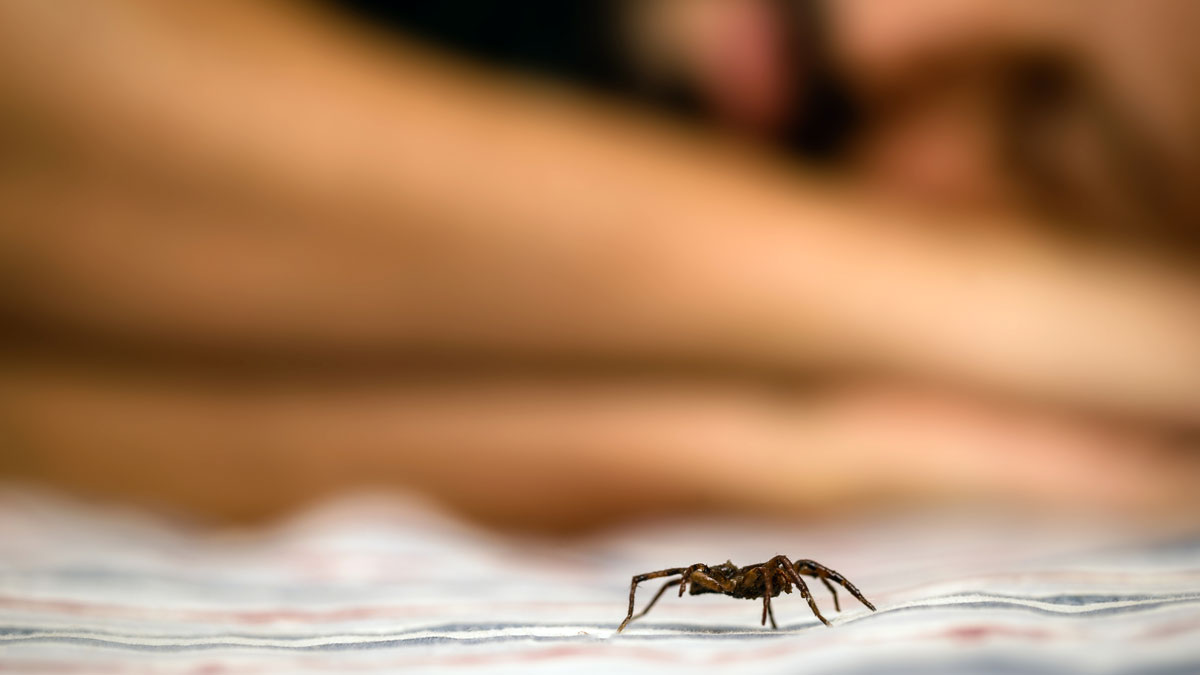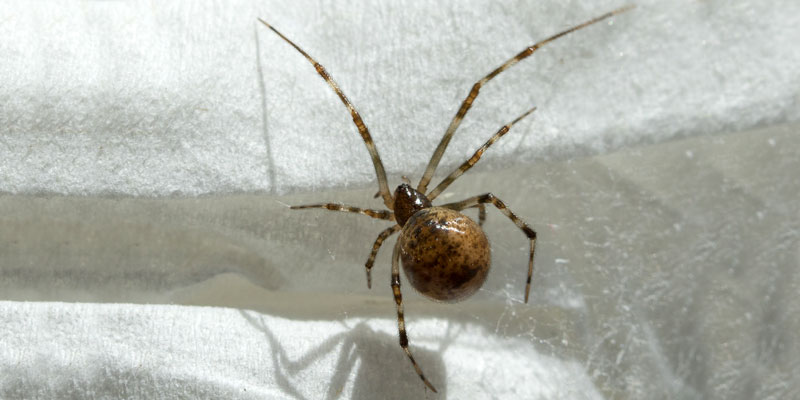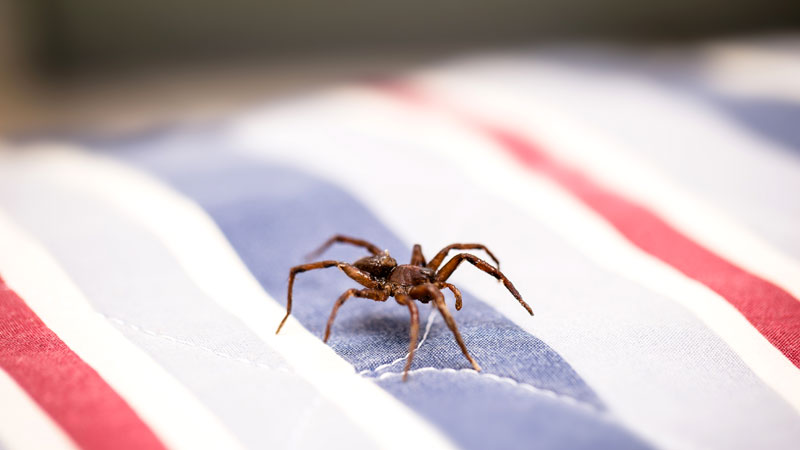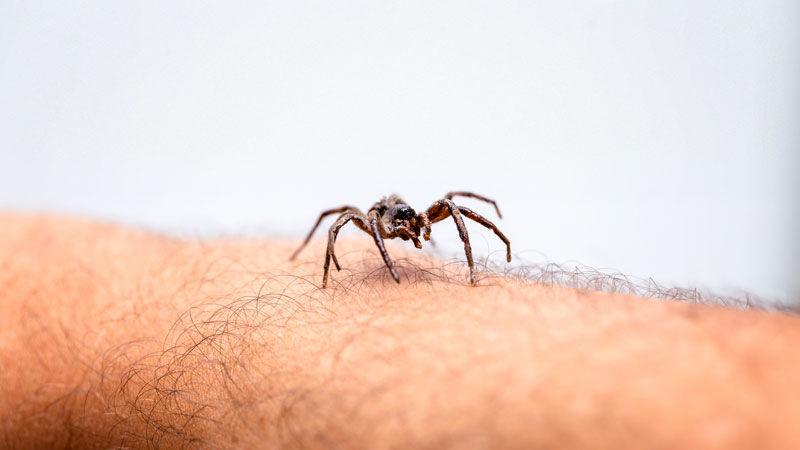There are many creepy-crawlies that may choose to pay you a visit in the middle of the night. But there’s a good chance that bite wasn’t caused by bed bugs.
In fact, one of the many late-night visitors can be found in almost any room and happens to be a major phobia. If you guessed spiders, you’re right!
However, spiders don’t just pop up without a good reason, which we’ll discuss later. Learning how to protect yourself from spiders while sleeping isn’t difficult, and may help you avoid several other bed pests as well.
How to Keep Spiders Away While Sleeping
Spiders would rather avoid you, even when you’re asleep. But what can you do to make the chances of finding a spider in bed with you drop even further? Here are a few easy ways to encourage them to stay away.
#1 – Clean Often
Spiders are shy and will seek out hiding spots, so keeping your rooms clutter-free greatly reduces the risk of running into spiders under bed frames or behind the headboard.
In addition, having clean sheets and a vacuumed floor will discourage bed worms and other pests that spiders prey on. This equates to less reason for the spider to visit.
#2 – Lower the Thermostat
Spiders tend to prefer warmer temperatures, so try dropping your thermostat to below 70 degrees at night. If you want to take it a step further and have the ability to do so, pick one room to be warmer so any spiders will be drawn there at night.
#3 – Set Traps
We couldn’t tell you how to keep spiders away from your bed without bringing up this little trick. Begin by pulling your bed at least eight inches away from the wall.
This means the only way into your bed is to climb the legs or drop from above. You can then surround the legs with glue traps or (if you’re careful not to get stuck) tape the glue traps onto the legs themselves.
For a less messy alternative you can also use with couches and chairs, sprinkle some food grade diatomaceous earth (DE) around the legs. It’s perfectly safe for your family and pets, but DE will cause fatal wounds to arachnids and insects alike.
#4 – Use Repellents
Repellents such as eucalyptus oil or lavender can be a mixed bag and your mileage may vary. However, they’re usually effective in keeping spiders away, more often because they repel the spiders’ prey than repelling the spiders themselves.
That’s not to say you shouldn’t try them. Aromatherapy is a great way to help you sleep, and these oils can really help relax you.
However, two of the most effective repellents are ones you might have to think about before trying.
The first is peppermint oil, which smells great but is also a stimulant, meaning it could keep you more awake than the thought of spiders.
The second is chestnuts.
While there is no definitive study to prove it, evidence shows that spiders avoid chestnuts (including inedible horse chestnuts). Simply invest in some chestnut oil or place some chestnuts around the feet of your bed for surprisingly reliable results.
Spider Psychology 101
To ensure you won’t have spiders in bed with you, we must get into their heads to figure out why they would join you in the first place.
Spiders are generally very shy and will only approach a human if cornered. In most cases, they do their best to avoid people. However, a few species can be more aggressive and will defend their nest. Thankfully, these species aren’t known to be home invaders.
Reasons Spiders Might Visit Your Bed
Spiders look for the basic necessities in life: food, water, and shelter (they’re not all that worried about clothing, which is almost impossible to find in their size). Sometimes they wander inside to escape extreme temperatures or major storms. The rest of the time they’d much rather be outside where all the food is. But what happens when you have a spider infestation?
A spider will often wander indoors and decide to stick around if they find there are insects or other goodies around. The more food available, the more they’ll want to hang around.
They may even decide to have their babies in your home if there are enough insects to feed them. After all, baby spiders will resort to cannibalism if there’s not much food about.
And this brings us to the bedroom (and couch). Places where you tend to sleep to rest will generally be covered in shed skin, food crumbs, and other things that pests absolutely love. Dust mites, bed bugs, fleas, flies… the list of critters that might be drawn in is quite extensive. And most, if not all of these may be on a spider’s menu.
They may also simply try to hide in your room to stay warm during winter months.
Are Deadly Spiders Likely to Visit You in Your Sleep?
This is a rather important question, because there’s a big difference between being bitten by a harmless spider and a potential killer.
However, you’ll be (potentially) relieved to hear that you’re far more likely to get a visit from a harmless species than the more dangerous ones. For example:
- Black widows (which aren’t as lethal as their reputation suggests) prefer basements or attics, far from human activity.
- Brown recluse spiders are far more dangerous and tend to hide in clutter. They’re not aggressive, but will bite if startled.
- Hobo spiders are actually aggressive, albeit mostly harmless. There’s some risk of one wandering into your room, although the risk is low unless one builds a funnel web nearby.
- Jumping spiders are pretty much harmless (excluding the potential for causing heart attacks) but would much rather hang out in a sunny window than share a bed. However, you might run into one if napping on a couch or in a chair.
- Sac spiders are the most likely bedroom visitors and various species under this category tend to among be the most common household spiders. They’re harmless, but can be quite prolific if allowed to stick around long enough to breed.
- Finally, wolf spiders are like bikers – big, bad, but ultimately lovable and gentle. These are avid hunters, meaning they’re probably the most likely to visit your napping spot after sac spiders.
So as you can see, the spiders you should be most worried about are the ones that are just as likely to be avoiding you. But that raises another common dilemma:
Common Claims Regarding Spiders and Sleep
Okay, we have to address a few common horror stories here before moving on. You’ve no doubt heard someone insist they know someone these things have happened to or read online that they can occur, but is this really the case?
Here are three common claims and the truth regarding them.
#1 – Do Spiders Crawl Into Your Ears or Nose?
This concept came about because of the popular urban legend that usually revolves around a girl falling asleep against a tree or in the grass. She wakes up to a strange itching in her ear and/or hearing a strange, faint sound.
Nothing she does can stop this, and it starts driving her mad. Finally, she goes to a doctor only to have dozens of spiderlings crawl out of her ear.
Guess what? This doesn’t happen. While there’s some very remote possibility a spider could get stuck in your ear canal, there’s no incentive for them to even go near your ears or nose, let alone venture inside.
#2 – Do Spiders Crawl in Your Mouth When You Sleep?
Okay, so this one hasn’t made it into a CreepyPasta just yet, but it’s still a rather old myth – and yes, it IS a myth.
Spiders prefer to avoid humans, even the aggressive ones, so the thought of one deliberately crawling onto your face, making its way into your mouth as you snore, and then getting swallowed even once is absolutely crazy. And this myth usually says you eat eight spiders every single year!
Can it happen once or twice? Of course, but it would probably be about as likely as getting struck by lightning. To put this into perspective, imagine walking up to a sleeping dragon, crawling between its fangs, and getting yourself swallowed. Not very likely, is it?
#3 – Do Spiders Crawl on You in Your Sleep?
The third claim we’ll look at is a bit more probable, but still extremely rare. Spiders will generally try to avoid crawling on you, although it sometimes happens by accident.
A lot of the stories behind this revolve around a spider that was already hiding before you rolled on top of it, or are based on the fact that spiders sometimes accidentally land on you while trying to drop from a higher surface.
So while it’s possible for a spider to crawl on you while you sleep (especially if you tend to stay still while sleeping), it’s extremely rare. Any instances of getting bitten are usually because of some other critter.
And sightings of an eight-legged critter in your bed are just as likely to be harmless harvestmen as they are to be spiders.
- How to Get Rid of Hawks - March 8, 2024
- How to Get Rid of Pill Bugs (Rolly Pollies) - March 1, 2024
- How to Get Rid of Groundhogs (Woodchucks) - February 5, 2024




